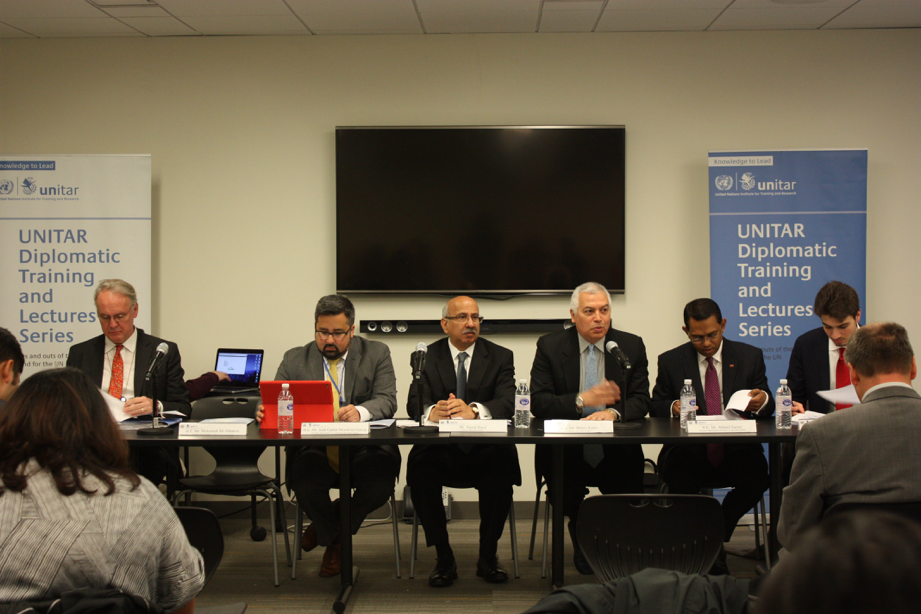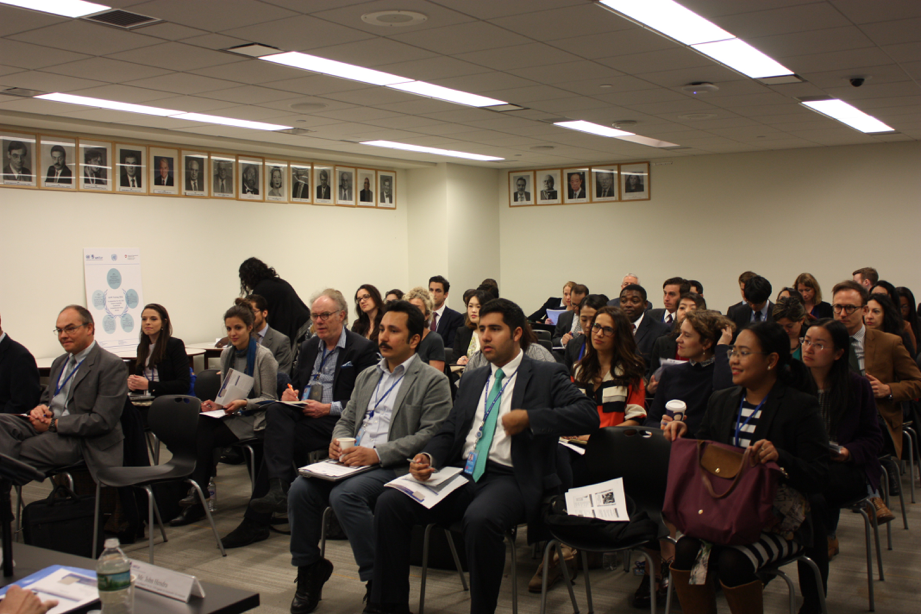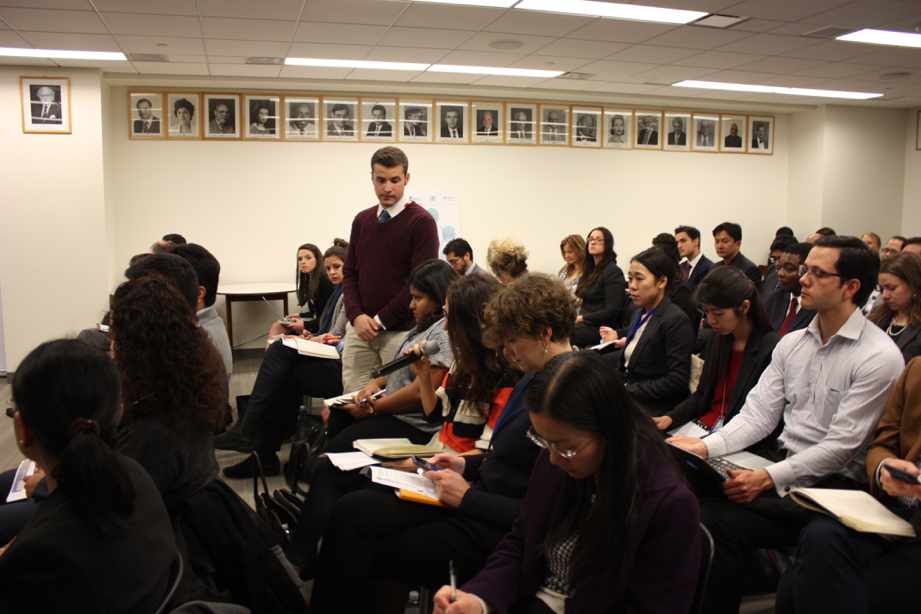QCPR Module 2- Quadrennial Comprehensive Policy Review

29 April 2016, New York, USA – The United Nations Institute for Training and Research's (UNITAR) New York Office partnered with the Permanent Mission of Switzerland to the United Nations and the United Nations Department of Economic and Social Affairs (DESA) for the “Second Module of the Quadrennial Comprehensive Policy Review” on 29 April 2016. The workshop was attended by approximately 50 delegates from several Permanent Missions in New York.
Mr. Marco A. Suazo, Senior Advisor and Acting Head of the UNITAR New York Office, started the workshop, providing a brief overview of the second QCPR training module and the role of UNITAR for QCPR Training. The first session was moderated by Mr. Navid Hanif, Director of Office for ECOSOC Support and Coordination at DESA. Mr. Hanif stressed that the upcoming QCPR should be distinct in terms of speed, scale, and scope. This second module highlighted the perspectives of middle income countries, conflict-affected countries, and small island developing states (SIDS) in order to address UN Development System reform and how the development system can deliver on the 2030 Agenda, to help guide member states in the writing of the 2016 QCPR.
The first speaker was H.E. Mr. Juan Carlos Mendoza-García, Permanent Representative of Costa Rica to the UN, who delivered the middle income countries’ perspectives, particularly considering their contributions to the UN have increased. Ambassador García mentioned fragmented functions and contributions within the UN system, mandates in the Addis Ababa Action Agenda, and the principle of “no one should be left behind”. Participants discussed topics regarding the development index, the definition of “middle income country”, the unification of different functions and programs, the long-term and short-term implications of the QCPR for middle-income countries, resource allocation for LDCs, South-South and triangular cooperation, and non-income factors.
H.E. Mr. Ahmed Sareer, Permanent Representative of Maldives to the UN, represented the SIDS perspectives. He stressed that the UN development system should act as one unit, rather than as individuals competing for limited resources. He also emphasized the monitoring and review mechanism, data collection, and analysis by the UN development system.
The third speaker, H.E. Mr. Mohamed Ali Alhakim, Permanent Representative of Iraq to the UN, discussed the challenges facing post-conflict countries and how the UN development system addresses these issues. He explained why conflict arises and how to handle conflict based on Iraq’s experience. During the Q&A session, recovery processes and as well as the process for acquiring funds from the UN Development System were addressed. The speaker spoke on the UN and NGO’s role in humanitarian aid and development, as well as coordination between UN entities.
Mr. Anne Poorta, First Secretary of the Permanent Mission of the Netherlands to the UN, spoke from a high-income country perspective. He addressed the need to fix the fragmentation of the UN System and to encourage the General Assembly to fill in the gaps that are present at the global level, for instance SDG 10, SDG 12, SDG 13, and SDG 14. Mr. Poorta also mentioned the need to have a shorter and more coherent QCPR that can respond to the universality of the new agenda, with a more long term perspective.
 Mr. John Hendra, Senior Coordinator of the UN “Fit-for-Purpose” for the 2030 Agenda for Sustainable Development, explained the functions of the QCPR, starting with the lessons learned from previous QCPRs. In particular, he stated that fighting against “business as usual” is at the core of the new 2030 Agenda. He argued that fit-for purpose is a real opportunity to look at the purposes and functions of the UN system. He mentioned 6 relevant points: 1. Strengthening UN support for countries in the implementation of the SDGs and human rights commitments; 2. Providing integrated policy support; 3. Continue maximizing policy support through different stakeholders; 4. Leveraging partnerships to maximize support for the 2030 Agenda; 5. Strengthening capacity building, as well as south-south and triangular cooperation; and 6. Focus on preventative, planning system in order to achieve a more integrated, humanitarian UN.
Mr. John Hendra, Senior Coordinator of the UN “Fit-for-Purpose” for the 2030 Agenda for Sustainable Development, explained the functions of the QCPR, starting with the lessons learned from previous QCPRs. In particular, he stated that fighting against “business as usual” is at the core of the new 2030 Agenda. He argued that fit-for purpose is a real opportunity to look at the purposes and functions of the UN system. He mentioned 6 relevant points: 1. Strengthening UN support for countries in the implementation of the SDGs and human rights commitments; 2. Providing integrated policy support; 3. Continue maximizing policy support through different stakeholders; 4. Leveraging partnerships to maximize support for the 2030 Agenda; 5. Strengthening capacity building, as well as south-south and triangular cooperation; and 6. Focus on preventative, planning system in order to achieve a more integrated, humanitarian UN.
The final speaker of the workshop was Ms. Denise Cook, the United Nations Resident Coordinator in Uruguay. Ms. Cook explained that Uruguay was one of the original Delivering as One (DaO) countries. She reflected on the field’s perspective on opportunities and challenges related to the QCPR. Ms. Cook mentioned that much has been done at the country level to harmonize and simplify business practices; however, she called for UN headquarters to improve communication and guidance with UN Country Team representatives.
Photos: Participants and facilitators of the seminar

